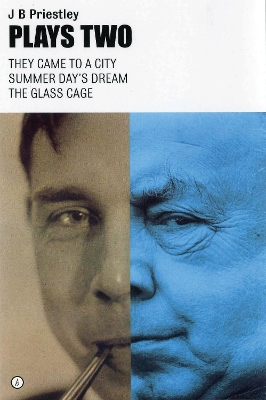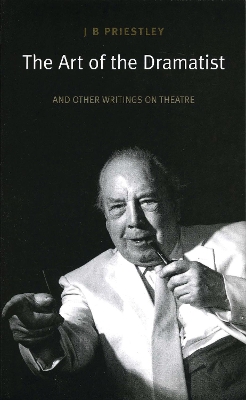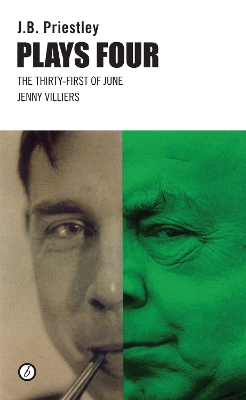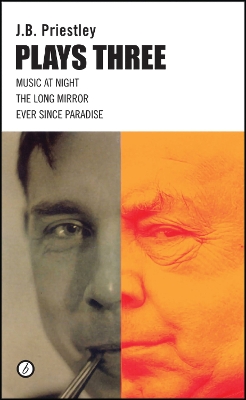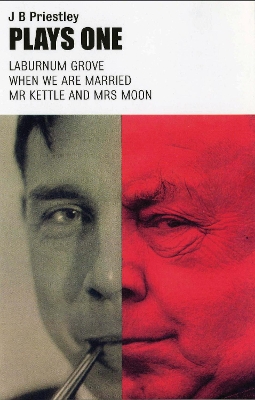Oberon Modern Playwrights
5 total works
Includes the plays They Came to a City, Summer Day's Dream and The Glass Cage
With an introduction by Tom Priestley.
All three dramas in this second volume of J B Priestley's plays investigate the question of an individual's responsibility towards his or her family and community. In They Came to a City, written at the height of the Second World War, a mixed bag of Britons mysteriously find themselves outside a strange city. What kind of 'New Jerusalem' is this, and will it suit everybody?
Summer Day's Dream, first performed in 1949, is set in the future - 1975. In a Britain bombed back into pre-industrial past, three representatives of the new world order disturb the tranquil lives of three generations of an English family. The themes of hypocrisy and redemption are brought to the fore in The Glass Cage, when three black sheep of a respectable Toronto clan are grudgingly welcomed back into the family home.
With an introduction by Tom Priestley.
All three dramas in this second volume of J B Priestley's plays investigate the question of an individual's responsibility towards his or her family and community. In They Came to a City, written at the height of the Second World War, a mixed bag of Britons mysteriously find themselves outside a strange city. What kind of 'New Jerusalem' is this, and will it suit everybody?
Summer Day's Dream, first performed in 1949, is set in the future - 1975. In a Britain bombed back into pre-industrial past, three representatives of the new world order disturb the tranquil lives of three generations of an English family. The themes of hypocrisy and redemption are brought to the fore in The Glass Cage, when three black sheep of a respectable Toronto clan are grudgingly welcomed back into the family home.
In these passionate and witty essays on the theatre, J B Priestley distils his experience as a playwright, producer, director and - just once - actor. Relishing the past, analysing the present, and predicting the future, he tells his own 'story of the theatre'.
Published as a companion to Oberon's two volumes of Priestley's best plays, this new collection is part defence of theatre, part incisive criticism, and, in the renowned Old Vic lecture The Art of the Dramatist, part instructive guide for would-be playwrights.
Published as a companion to Oberon's two volumes of Priestley's best plays, this new collection is part defence of theatre, part incisive criticism, and, in the renowned Old Vic lecture The Art of the Dramatist, part instructive guide for would-be playwrights.
Two little known Priestley plays, which, while they are quite different, have important features in common.
The 31st of June is a comedy set partly in an advertising agency and partly in a medieval castle; Jenny Villiers is a serious play set backstage in an old provincial theatre. But both exploit elements of Time. In the 31st of June scenes switch between modern times and the middle ages, while characters move between both. There are kings, company bosses, princesses, fashion models, dwarves and two rival magicians. causing confusion and romance.
Jenny Villiers examines life in the Theatre. The doubts of the present are confronted by players from the past, and a jaded playwright recovers his faith in the Theatre. Both plays were performed on the stage, but later rewritten and published as novels.
The 31st of June is a comedy set partly in an advertising agency and partly in a medieval castle; Jenny Villiers is a serious play set backstage in an old provincial theatre. But both exploit elements of Time. In the 31st of June scenes switch between modern times and the middle ages, while characters move between both. There are kings, company bosses, princesses, fashion models, dwarves and two rival magicians. causing confusion and romance.
Jenny Villiers examines life in the Theatre. The doubts of the present are confronted by players from the past, and a jaded playwright recovers his faith in the Theatre. Both plays were performed on the stage, but later rewritten and published as novels.
Music at Night centres on a group of people attending a musical evening to hear a new work. Each act follows a movement in the music, which inspires the listeners to react each in their own way, looking inside themselves for their true feelings and sometimes remembering significant moments from their past. As often in Priestley’s work, the relations between the sexes play an important part, a theme which recurs in the other two plays.
The Long Mirror recounts the meeting between a composer and a young woman who seems to have been telepathically connected to him for some time, and has experienced much of his life before actually meeting him. Her knowledge of his past can help his future as an artist and a husband. It was based on a true incident.
Ever Since Paradise he described as ‘A Discursive Entertainment, chiefly referring to Love and Marriage in Three Acts’. Three couples are made up of The Musicians, the Commentators and The Example, and together they illustrate various aspects of relationships, accompanied by appropriate music on two pianos.
The Long Mirror recounts the meeting between a composer and a young woman who seems to have been telepathically connected to him for some time, and has experienced much of his life before actually meeting him. Her knowledge of his past can help his future as an artist and a husband. It was based on a true incident.
Ever Since Paradise he described as ‘A Discursive Entertainment, chiefly referring to Love and Marriage in Three Acts’. Three couples are made up of The Musicians, the Commentators and The Example, and together they illustrate various aspects of relationships, accompanied by appropriate music on two pianos.
Includes the plays Laburnum Grove, When We Are Married and Mr Kettle and Mrs Moon
With an introduction by Tom Priestley and a foreword by Roy Hattersley.
These three domestic comedies display J B Priestley's talent for the ordinary situation turned sharply on its head. In Laburnum Grove George Radfern's friends and relations want a share of his wealth - until they find out where it's come from. When We Are Married features three high-minded couples who gather to celebrate their silver wedding anniversaries, only to discover they were never properly married at all.
And in Mr Kettle and Mrs Moon an unassuming bank manager turns rebel when a voice tells him to pack in his position and stay at home.In these mischievous depictions of respectability gone awry, the proud and the prejudiced battle against emerging truths and potential scandal. J B Priestley proves himself a skilled craftsman and presents his characters with rich humour, warmth and humanity.
With an introduction by Tom Priestley and a foreword by Roy Hattersley.
These three domestic comedies display J B Priestley's talent for the ordinary situation turned sharply on its head. In Laburnum Grove George Radfern's friends and relations want a share of his wealth - until they find out where it's come from. When We Are Married features three high-minded couples who gather to celebrate their silver wedding anniversaries, only to discover they were never properly married at all.
And in Mr Kettle and Mrs Moon an unassuming bank manager turns rebel when a voice tells him to pack in his position and stay at home.In these mischievous depictions of respectability gone awry, the proud and the prejudiced battle against emerging truths and potential scandal. J B Priestley proves himself a skilled craftsman and presents his characters with rich humour, warmth and humanity.
